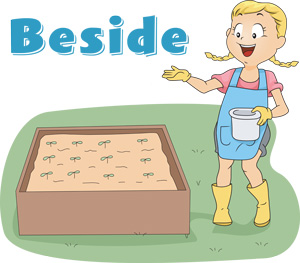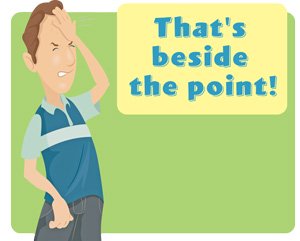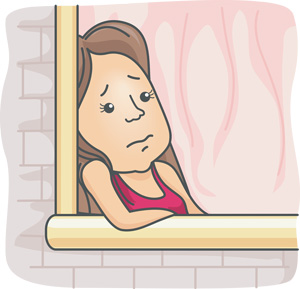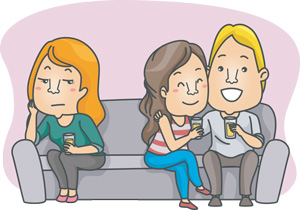Beside vs. Besides
What is the difference?
Many students have difficulty understanding the difference between beside and besides. In fact, sometimes even native speakers have doubts about the distinction between the two words. When should you use each one?
Although there is only a tiny difference in their spellings, the two words are used in very different ways. They represent distinct parts of speech and have separate grammatical functions. It is important to learn the difference between beside and besides, because both words come up frequently in everyday speech and writing. In addition, if you use the two words properly you will be able to impress even native English speakers.
Let's look at some examples to help you understand the difference.
Click Here for Step-by-Step Rules, Stories and Exercises to Practice All English Tenses
Beside
The word beside is a preposition. This means that it is a word that connects two nouns. Usually beside is used as a synonym for next to, but it can also mean near or close to. Beside is more formal than next to, near and close to, but it is still a very common word.

In addition to this meaning, beside is commonly used in the following two expressions:
- To be beside the point
This expression means that something is irrelevant or not important. The meaning of the expression comes from the idea of "next to."
If something is beside the point, it means that whatever you are talking about is separate from the main idea, or not related to the main idea. People often use this expression when they feel frustrated with something, exclaiming, "That's beside the point!"

- To be beside oneself (or myself, yourself, himself, herself, itself…)
This expression means that someone feels overwhelmed by a certain emotion. If no emotion is specified, it means that the person feels extremely stressed out or sad (or both). When a particular feeling such as joy, excitement or happiness is specified, the expression means that the person is overwhelmed by that feeling.

Examples
- I love sitting beside the fire on cold winter nights.
(In the wintertime, I enjoy sitting next to the warm fire.)
- Judith placed her bag on the empty seat beside her.
(Judith put her bag on the empty seat next to her.)
- My dog is very well trained. When I take him out, he walks beside me and never runs ahead.
(I have a well-behaved dog. When we go on outside, he walks by my side.)
- I know it's not your fault, but that's beside the point!
(I know it's not your fault, but I'm still upset!)
- Anna was beside herself with joy when her boyfriend proposed to her.
(Anna felt extremely happy when her boyfriend proposed to her.)
Besides
The word besides can be used as both a preposition and an adverb. As a preposition, besides usually means in addition to or as well as. However, it can sometimes also mean except. The distinction between these two uses is usually clear from the context.
For example:
Besides tomatoes, she also needs carrots.
(In addition to tomatoes, she also needs carrots.)

There's no one here besides me.
(There's no one here except me.)

After besides you have to use either a noun or a gerund (the form of the verb that ends in –ing).
As an adverb, besides also means in addition. It is used to add extra facts or reasons to what you are saying, similar to moreover, furthermore and in any case.
I should go home now. Besides, they won't even notice if I leave.
(I should go home now. Moreover, they won't even notice if I leave.)

Bear in mind that this use of besides is relatively informal, and is more common in speech than in writing. You can use besides alone, or you can pair it with words such as this, that, the fact that or a specific detail.
Examples
- Gary loves sports. Besides football, he also plays baseball and basketball.
(Gary really enjoys sports. In addition to football, he plays baseball and basketball.)
- I had a great weekend. Besides going to the movies, I went to a birthday party and went shopping with some friends.
(This weekend I did many things. As well as going to the movies, I went to a birthday party and went shopping.)
- Besides my family, hardly anyone came to watch me perform in the school play.
(Except for my family, hardly anyone came to see me act in the school play.)
- Going camping sounds like a good idea. Besides, it's not like we have anything else to do this weekend!
(I think going camping is a good idea, because there isn't very much else we need to do this weekend.)
- Let's invite Olga to the party. She's fun to spend time with, and besides, we haven't seen her in a while.
(I think we should invite Olga to the party. We always like spending time with her and, in addition to that, we haven't seen her in a while.)

Tips
Sometimes native English speakers have doubts about whether the expression is, "to be beside the point" or "to be besides the point." Although in speech people sometimes say both, only the first expression is considered grammatically correct.
A Story to Practice Beside vs. Besides
Mrs. Shaw takes the number 22 bus home from work every day. Besides being convenient, it's an inexpensive way to travel around the city. Mrs. Shaw usually sits at the front, and tries to get a seat beside the window. Sometimes she runs into one of her friends, who comes and sits beside her. Besides Mrs. Shaw and her friend, there usually aren't very many people on the bus.
One day, Mrs. Shaw realized that she had lost her bag. She thought she might have left it on the bus, but she couldn't remember if she put it on the seat beside her, or on the floor beside her feet. Mrs. Shaw was beside herself with worry. Besides her wallet, her cell phone and house keys were in the bag. She just did not know what to do. She didn't have a lot of money in her wallet, but that was beside the point.
Luckily, when Mrs. Shaw got home, Mr. Shaw was already there. Mrs. Shaw had indeed left her bag on the bus, right at the front beside the driver's seat. The bus driver had called about 20 minutes before to say that he found it. He was able to recognize the bag, because besides being an unusual color, it had a distinctive pattern. When she learned this, Mrs. Shaw was beside herself with joy. She decided to buy a present for the bus driver to say thank you. Besides a thank you note, she bought him a homemade cake.
Quiz
Answer the following 10 questions and then check your answers. Each question is worth 10 points.
Part 1:
- Which of the following is a correct definition of beside?
- As well as
- In addition to
- Except
- Close to
- Which of the following is a correct definition of besides?
- Near
- Next to
- Furthermore
- Unimportant
- Which sentence is written correctly?
- My pet cat is happy sitting besides me.
- Isabel is beside herself with excitement.
- Beside going to the gym, I might also see a movie.
- I have a lot of free time, but that's besides the point.
- Which of the following is written incorrectly?
- Beside me, there's no one else here.
- Who is the girl walking beside Julia?
- Besides being hungry, I'm also a little thirsty.
- What do you want to do besides going to the gym?
Part 2:
- The keys are on the table __________ the fruit bowl and the flowers.
- besides
- beside
- besides of
- beside of
- __________ Sophie and Kate, there was hardly anyone else in the movie theater.
- Besides (used to mean except for)
- Besides (used to mean in addition to)
- Beside (used to mean near or next to)
- Beside (used to mean other than)
- Spain is a great place to go for a vacation. __________ great weather, it's pretty inexpensive.
- Besides have
- Besides to have
- Besides of having
- Besides having
- Kim feels extremely happy. She is…
- besides with happiness.
- besides herself with happiness.
- beside with happiness.
- beside herself with happiness.
- Charlie often sits on the sofa __________ his aunt. __________ being fun to talk to, she can help him with his homework.
- beside; beside
- besides; besides
- beside; besides
- besides; beside
- I know you didn't mean to lose your keys, but…
- that's beside the point.
- this is besides the point.
- you're beside the point.
- it's besides the point.
Answer Key
Part 1: 1. D | 2. C | 3. B | 4. A
Part 2: 1. B | 2. A | 3. D | 4. D | 5. C | 6. A
Get Updates, Special Offers, and English Resources
Download your FREE GIFT (the first two chapters of
English Short Stories Book and Workbook)
as soon as you join!

By submitting your email, you consent to receiving updates and newsletters from us and to the sharing of your personal data with third parties for the purposes of sending you communications. We will not spam you. You can unsubscribe at any time. For more information, please see our privacy policy.





